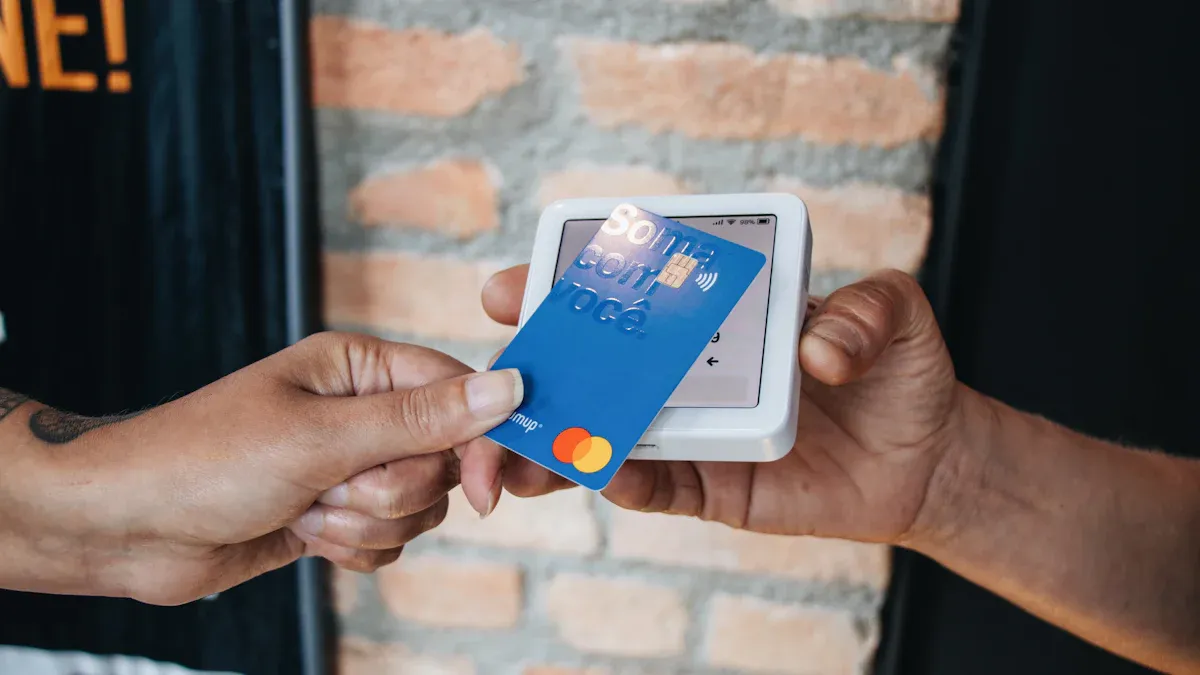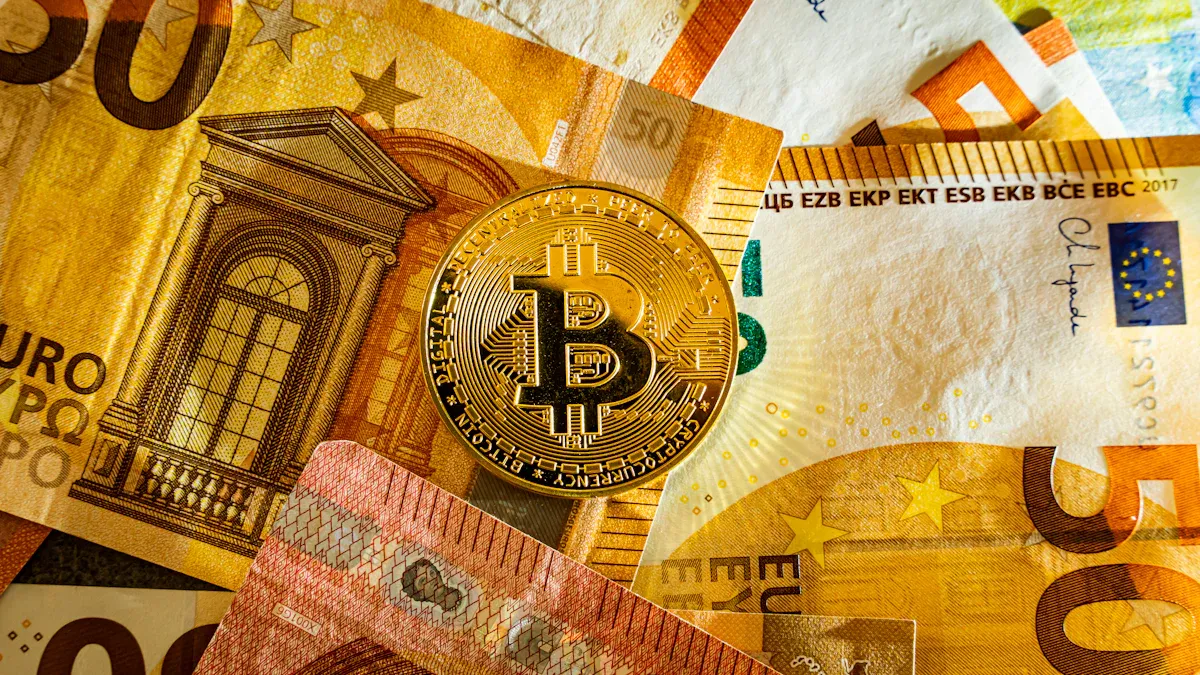- EasyCard
- Trade
- Help
- Announcement
- Academy
- SWIFT Code
- Iban Number
- Referral
- Customer Service
- Blog
- Creator
Anonymous Remittance: How to Make Free, Fast and Secure Remittances via Social Media, Payment Apps and Digital Currencies

Image Source: unsplash
You can achieve anonymous remittance through various methods, such as cryptocurrencies, prepaid cards, and community solutions. These methods vary in speed, cost, and security:
| Method | Speed | Cost | Security |
|---|---|---|---|
| Cryptocurrency | Fast | Variable | High |
| Prepaid Card | Medium | Low | Medium |
| Community Solutions | Variable | Low | Variable |
Fully anonymous remittance methods are often subject to legal and regulatory restrictions. You need to balance privacy and security when choosing, as many platforms require some level of identity verification.
Key Points
- When choosing an anonymous remittance method, consider speed, cost, and security. Social media platforms offer fast transfers but lower security, while payment apps provide high security but may require identity verification for large transactions.
- When using social media for anonymous remittance, avoid using your real name and phone number during registration; using a virtual phone number can enhance privacy protection.
- In payment apps, selecting apps that support cryptocurrencies can improve anonymity. Using temporary emails and virtual phone numbers during registration further protects personal information.
- Cryptocurrencies offer flexible anonymous remittance options; using privacy coins and mixing services can enhance transaction privacy, but you must be aware of security and compliance risks.
- When conducting anonymous remittances, always understand local laws and regulations, comply with requirements, and avoid legal risks and scams.
Anonymous Remittance via Social Media Platforms

Image Source: unsplash
Operation Process
You can perform anonymous remittance through social media platforms. Common platforms include WeChat, Telegram, and others. These platforms typically offer transfer or red envelope functions. You only need to register an account, link a payment method, select the recipient, enter the amount, and complete the transfer.
On Telegram, you can transfer funds through bots or group administrators. You simply send funds to the designated intermediary account, and they transfer the equivalent amount to the recipient.
In some online forums or groups, you can also contact intermediaries via private messages to negotiate remittance details. This method is simple to operate and suitable for small, fast transfers.
Anonymity Tips
If you want to enhance anonymity, you can use the following methods:
- When registering a new account, avoid using your real name and commonly used phone number.
- On platforms like WeChat, you can register with a virtual phone number to reduce identity exposure.
- On Telegram, it’s recommended to use encrypted chats and temporary accounts.
- Transfer funds through third-party intermediaries or bots to further conceal your identity.
- Do not disclose personal information in public groups.
These tips can help you achieve a higher level of anonymity on social platforms.
Fees and Speed
Remittance speed on social media platforms is usually fast. WeChat transfers are almost instant, and Telegram intermediary transfers can be completed within minutes.In terms of fees, WeChat transfers within the platform are generally free, but cross-border transactions or withdrawals may incur a 1-2% fee, priced in USD. Telegram and similar platforms’ intermediary service fees typically range from 1-3 USD, depending on the amount and intermediary rules.
You need to understand the platform’s fee structure in advance to avoid unnecessary losses.
Security Risks
When using social media platforms for anonymous remittance, you need to be aware of the following risks:
- Informal remittances lack official channels and regulation, making it impossible to file complaints if issues arise.
- Without authorized services, users and their families lack protection and are vulnerable to scams or unauthorized charges.
- If funds fail to arrive or are fraudulent, users cannot track or reclaim them.
These risks indicate that while anonymous remittances may seem simple and fast, they have lower security. You should be extra cautious during operations and choose reputable intermediaries or platforms.
Applicable Scenarios
Anonymous remittance via social media platforms is suitable for the following scenarios:
- You need small, fast transfers with certain anonymity requirements.
- You and the recipient are on the same platform, making operations convenient.
- You cannot use traditional banking channels or want to bypass real-name verification.
- You are outside China/China mainland and want to withdraw or convert to USD via a licensed Hong Kong bank account.
This method is not suitable for large amounts or frequent long-term operations. You should choose the most appropriate anonymous remittance method based on your actual needs.
Anonymous Remittance via Payment Apps
Operation Process
You can achieve anonymous remittance through various mainstream payment apps. Taking Cash App as an example, the operation steps are as follows:
- Open the Cash App application.
- Enter the amount you want to send.
- Click the “Pay” button.
- Enter the recipient’s $Cashtag, email address, or phone number.
- Confirm the information and click “Pay” to complete the transfer.
The process for PayPal and Venmo is similar. You only need to register an account, link a bank or credit card, and enter the recipient’s information to complete the remittance. Some apps support registration with virtual identities or temporary emails, further enhancing anonymity. When using these apps, it’s recommended to prioritize platforms that support multi-currency and international transfers for convenient fund flow with licensed Hong Kong bank accounts outside China/China mainland.
Privacy Protection
Mainstream payment apps have varying privacy protection features. The table below compares the anonymity and target users of different apps:
| App | Features | Advantages | Disadvantages | Best Suited For |
|---|---|---|---|---|
| Signal | Uses cryptocurrency for private payments, end-to-end encryption. | Highly secure and private. | Limited to MobileCoin cryptocurrency. | Users already on Signal who want seamless private payments. |
| Wasabi Wallet | Bitcoin wallet using CoinJoin to obfuscate transaction trails. | Fully anonymous Bitcoin transactions. | Requires basic Bitcoin knowledge. | Bitcoin users seeking maximum transaction privacy. |
| Crypto.com | Supports transfers in multiple cryptocurrencies, including privacy coins. | Supports Monero and Zcash privacy coins. | Large transactions require account verification. | Users seeking a versatile crypto platform with privacy options. |
| Cash App | Allows Bitcoin transfers, anonymous if handled properly. | Popular and widely accepted. | Large transactions require identity verification. | Casual users preferring a mix of traditional and crypto payments. |
| Monero Wallets | Designed as fully untraceable privacy coins. | Superior privacy compared to Bitcoin. | Limited merchant adoption. | Users prioritizing cryptocurrency privacy. |
When choosing a payment app, you can prioritize those supporting cryptocurrencies or privacy coins. If you prefer traditional payment methods, PayPal and Cash App can offer some level of anonymous remittance, but large transactions typically require identity verification. You can further protect personal privacy by registering new accounts, using temporary emails, and virtual phone numbers.
Fee Avoidance
The fee structures of payment apps vary. You should note the following when using them:
- Cash App and Venmo transfers within the platform are usually free, but withdrawing to a bank card or making international transfers may incur 1-3% fees, priced in USD.
- PayPal supports multi-currency transfers, with international remittance fees typically ranging from 2-4 USD, depending on the amount and recipient region.
- Some apps support cryptocurrency transfers with lower fees, but you need to monitor exchange rate fluctuations and platform policies.
Tip: You can choose direct in-platform transfers to avoid withdrawals or cross-border operations, reducing fees. Some apps waive certain fees during specific events, so check official announcements.
Security Measures
When conducting anonymous remittances, you must prioritize the security of funds and personal information. The following measures can effectively protect your account:
- Send funds only to trusted individuals. Since transfers are fast, it’s recommended to deal only with familiar parties.
- Treat P2P payment apps like cash and handle each transfer cautiously.
- Verify the recipient’s identity. If someone requests funds via an app, confirm their identity via phone or other means.
- Enable multi-factor authentication and regularly update account passwords to prevent theft.
- Set privacy permissions appropriately to avoid exposing personal information and transaction records.
Mainstream payment apps generally use encryption to protect user data, but you must stay vigilant to prevent online scams and phishing attacks.
Applicable Users
Anonymous remittance via payment apps is suitable for various users:
- Millennials and Gen X users are more inclined to use mobile payments, especially in metropolitan areas.
- If you have a bank account and higher education, you are typically more likely to adopt and proficiently use these apps.
- Groups with high smartphone penetration find payment apps more convenient.
- If you need small, fast, anonymous remittances with licensed Hong Kong bank accounts outside China/China mainland, payment apps are an ideal choice.
Payment apps provide convenient and secure anonymous remittance methods, but you should consider your needs, transaction size, and privacy requirements to mitigate risks effectively.
Anonymous Remittance via Cryptocurrencies

Image Source: pexels
Operation Steps
You can achieve anonymous remittance through cryptocurrencies in several ways. Common operation steps include:
- You can purchase Bitcoin or USDT on peer-to-peer markets without revealing your real identity.
- You can use Bitcoin ATMs for cash transactions to maintain anonymity.
- You can conduct Bitcoin or USDT transactions through a secure VPN connection to hide your IP address and geographic location.
These methods are suitable for fund transfers with licensed Hong Kong bank accounts outside China/China mainland. When choosing a platform, pay attention to its compliance and reputation.
Enhancing Anonymity
If you want to further enhance anonymity, consider the following methods:
- You can choose privacy coins like Monero, ZCash, or Dash, which are designed to protect user privacy.
- You can use mixing services to blend your transactions with others, safeguarding identity information.
- You can also try the CoinJoin method to mix your assets with other users’ assets, enhancing transaction privacy.
These methods can effectively improve the security level of your anonymous remittances and reduce identity exposure risks.
Fees and Speed
Cryptocurrency fees and delivery speeds vary depending on the coin type and network congestion. Bitcoin and USDT transfers are typically fast, ranging from a few minutes to tens of minutes. Fees generally range from 1-5 USD, depending on network conditions and platform policies. Emerging payment tools like CBDCs can sometimes offer lower fees and faster speeds, but you need to monitor related policies and compliance requirements.
Tip: You can transfer during off-peak network times to reduce fees.
Security Protection
When conducting anonymous cryptocurrency remittances, you must prioritize security protection. It’s recommended to take the following measures:
- You can use secure wallets, including hot and cold wallets, to protect asset safety.
- You should use secure payment gateways and APIs to prevent data leaks.
- You can enable multi-factor authentication to prevent account theft.
- You should regularly update systems and wallet software to patch security vulnerabilities.
- You should also monitor legal and regulatory requirements to avoid compliance risks.
These measures can help you reduce the risk of theft or scams and ensure fund safety.
Applicable Scenarios
Anonymous cryptocurrency remittance is suitable for the following scenarios:
- You need small to medium fund transfers with licensed Hong Kong bank accounts outside China/China mainland.
- You want to protect personal privacy and avoid traditional bank real-name verification.
- You need fast, low-cost international remittances.
- You have some understanding of cryptocurrencies and can manage wallets and private keys.
Cryptocurrencies offer flexible anonymous remittance options, but you must pay attention to security and compliance risks during operations.
Method Comparison and Recommendations
Security Comparison
When choosing an anonymous remittance method, security is one of the most critical factors. Social media platforms have lower security due to the lack of official regulation, making them prone to scams. Payment apps offer higher security, typically using encryption to protect user information, but large transactions may require identity verification. Cryptocurrency security depends on how you operate. Using privacy coins and mixing services can provide high anonymity, but if mismanaged, private key loss or cyberattacks can lead to fund loss.
Tip: Prioritize platforms with good reputations and enable multi-factor authentication to protect account security.
Speed and Fees
The speed and fees of different methods vary significantly. You can refer to the table below to quickly understand the applicable scenarios and pros and cons of each method:
| Remittance Method | Applicable Scenarios | Pros and Cons Description |
|---|---|---|
| Bank Transfer | Large international transfers | High security, high fees, long processing time. |
| Money Transfer Operators | Fast transfers or no bank account | Wide network, fast speed, lower fees than banks but higher than digital platforms. |
| Online Platforms and Mobile Apps | Fast, low-cost transfers | Low fees, fast service, suitable for tech-savvy users. |
| Informal Channels | Cost-sensitive and unconcerned about security | Low fees, but lacks protection and transparency, high risk. |
| Cryptocurrency | Cross-border payments, cost-sensitive cases | Low fees, fast speed, but faces regulatory uncertainty and volatility issues. |
When using social media platforms and payment apps, you can typically achieve delivery within minutes, with fees as low as free or 1-3 USD. Cryptocurrency transfers are fast, with fees of 1-5 USD, but you need to monitor network congestion and price volatility.
Scenario Recommendations
You can choose the most suitable method based on your actual needs:
- If you need small, fast transfers, social media platforms and payment apps are more suitable.
- If you don’t have a bank account, mobile payment apps and cryptocurrencies offer convenience.
- If you prioritize privacy and anonymity, cryptocurrencies (like Monero, ZCash) or mixing services are more advantageous.
- If you need large international transfers, choose bank transfers or large money transfer operators, which are safer despite higher fees.
You can leverage instant transactions and QR code payments on social payment platforms to improve remittance efficiency. Even without a traditional bank account, you can participate in digital financial activities through these methods.
Selection Recommendations
When choosing an anonymous remittance method, consider the following factors:
- How high are your security needs?
- Do you need fast delivery?
- Can you afford certain fees?
- Are you familiar with cryptocurrency or mobile payment operations?
- Do you need to transfer funds with licensed Hong Kong bank accounts outside China/China mainland?
You should avoid focusing solely on the lowest fees while ignoring security. For large or critical funds, prioritize safety and compliance. You can learn more about platform policies, diversify funds reasonably, and reduce risks.
Legal and Risk Considerations
Legal Risks
When conducting anonymous remittances, you must understand the legal risks in different jurisdictions. Many countries have strict regulations on anonymous fund flows. The table below summarizes the main legal risk types and their descriptions:
| Legal Risk Type | Description |
|---|---|
| Disclosure is Mandatory | U.S. citizens must report foreign accounts over $10,000 via FBAR and Form 8938. |
| Severe Penalties | Non-compliance may lead to fines, back taxes, or even criminal charges. |
| True Anonymity is Nearly Impossible | Banks now require detailed ownership documents and share data with tax authorities. |
| Compliance is Key | Properly structured trusts, LLCs, and foundations can protect assets within legal boundaries. |
If you ignore these risks, you may face hefty fines or even criminal liability. When using licensed Hong Kong bank accounts outside China/China mainland, you should also pay attention to local compliance requirements.
Compliance Recommendations
To avoid legal issues, you must follow these compliance guidelines:
- Implement strict Know Your Customer (KYC) procedures to verify the identity of senders and recipients.
- Comply with anti-money laundering and anti-terrorism financing laws.
- Adhere to customer privacy regulations, such as GDPR.
- Non-compliance may lead to significant legal issues, including fines and reputational damage.
When choosing a platform, prioritize service providers with strong compliance and transparent information. You should also regularly monitor policy changes and adjust operations accordingly.
Scam Prevention Tips
During anonymous remittances, you are vulnerable to scammers. Common scams include:
- Any suspicious money requests
- Requests to pay in unusual ways (e.g., gift cards or wire transfers)
- Investment opportunities promising high returns
- Transaction requests requiring confidentiality
- Requests to send money to unknown individuals
- Requests for upfront fees
- Requests to use untrustworthy third-party remittance services
- Requests emphasizing urgent action
You should stay vigilant and not trust unsolicited offers. Do not respond to emails, texts, or calls from unknown individuals, as these are often phishing attempts. Conduct due diligence before sending any funds. If an offer seems too good to be true, it’s likely a scam.
You can choose the most suitable anonymous remittance method based on your needs. Cryptocurrencies make financial services more accessible and reduce physical theft risks, but you must be aware of their volatility and security risks. Payment apps and social media platforms improve cost efficiency and financial inclusion, but they also carry risks of data breaches and fraud. When choosing, understand local laws and use secure, reputable services, avoid large unverified transfers, keep transaction records, and always balance privacy with compliance to ensure the safety of funds and personal information.
FAQ
Is anonymous remittance legal?
When using anonymous remittance in different countries, legal regulations vary. You need to understand local laws in advance. When using licensed Hong Kong bank accounts outside China/China mainland, you must also pay attention to compliance requirements.
Can I remit large amounts anonymously?
When remitting large amounts, platforms typically require identity verification. Anonymous large transfers are likely to attract regulatory attention. It’s best to choose compliant channels to avoid legal risks.
Is cryptocurrency remittance safe?
The safety of cryptocurrency remittance depends on your operations. You must protect your wallet and private keys. You should also choose secure wallets and platforms to prevent asset theft.
Will social media transfers leak personal information?
When transferring via social media platforms, using real information for registration may leak your identity. You can use virtual phone numbers and temporary emails to enhance privacy protection.
What are common scams in anonymous remittance?
During anonymous remittances, common scams include fake intermediaries, phishing websites, and fraudulent investments. You should verify the recipient’s identity, avoid trusting high-return promises, and prevent fund losses.
While social media, payment apps, and privacy coins offer flexibility for anonymous transfers, they come with significant risks—scams, lost keys, regulatory uncertainty—and rarely deliver truly free or fully anonymous transactions. When you need reliability, compliance, and practical usability, these options often force a trade-off between privacy and security.
BiyaPay offers a smarter balance: leveraging blockchain efficiency within a compliant framework. Fees as low as 0.5%, with same-day sending and receipt across multiple regions. We don’t promote illegal anonymity, but protect user privacy through decentralized architecture while meeting AML standards. Use the real-time exchange rate tool to lock in optimal rates and avoid hidden spreads.
Beyond remittance, BiyaPay transforms cross-border money into opportunity—invest directly in US and HK stocks without a local bank account, with zero fees on contract trades. Whether for personal transfers, family support, or micro-investing, BiyaPay redefines global finance with transparency, speed, and intelligence. Sign up today and experience next-generation money movement.
*This article is provided for general information purposes and does not constitute legal, tax or other professional advice from BiyaPay or its subsidiaries and its affiliates, and it is not intended as a substitute for obtaining advice from a financial advisor or any other professional.
We make no representations, warranties or warranties, express or implied, as to the accuracy, completeness or timeliness of the contents of this publication.




Contact Us
Company and Team
BiyaPay Products
Customer Services
is a broker-dealer registered with the U.S. Securities and Exchange Commission (SEC) (No.: 802-127417), member of the Financial Industry Regulatory Authority (FINRA) (CRD: 325027), member of the Securities Investor Protection Corporation (SIPC), and regulated by FINRA and SEC.
registered with the US Financial Crimes Enforcement Network (FinCEN), as a Money Services Business (MSB), registration number: 31000218637349, and regulated by FinCEN.
registered as Financial Service Provider (FSP number: FSP1007221) in New Zealand, and is a member of the Financial Dispute Resolution Scheme, a New Zealand independent dispute resolution service provider.



















